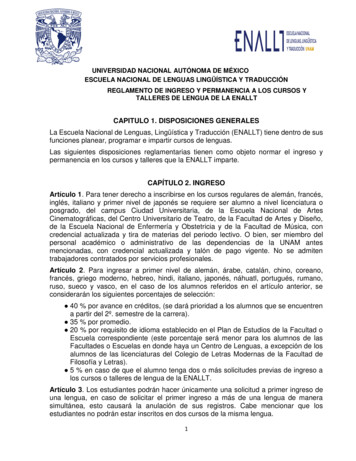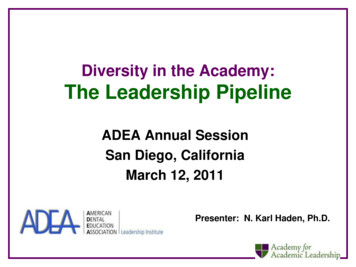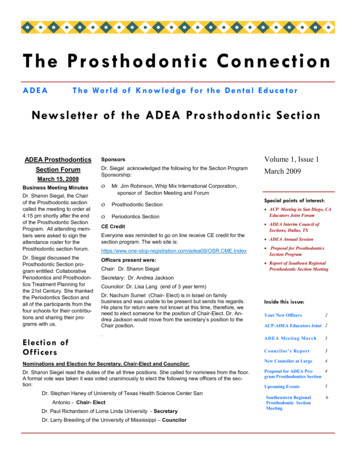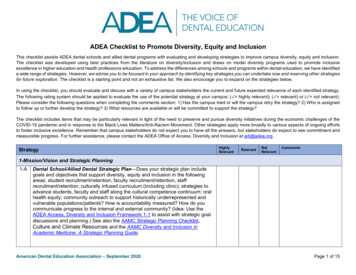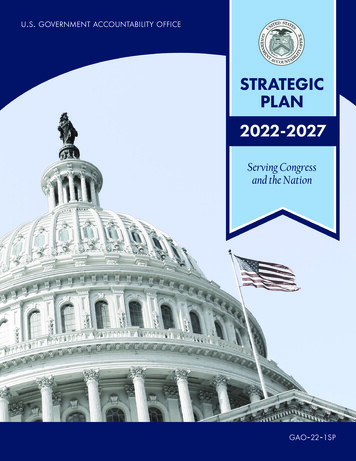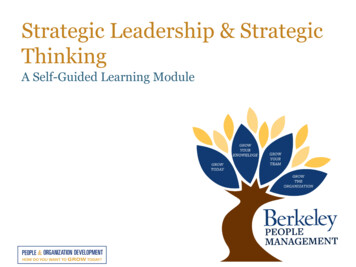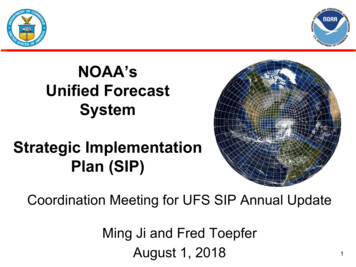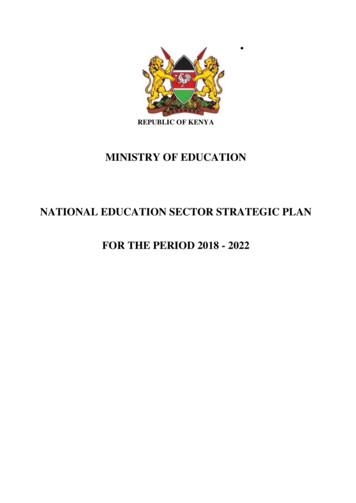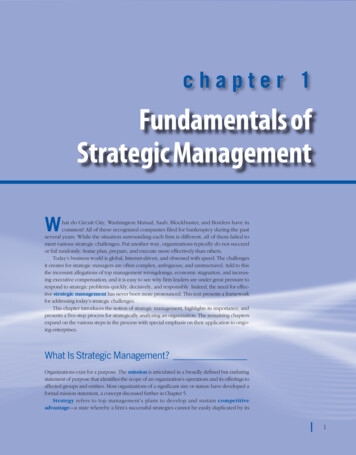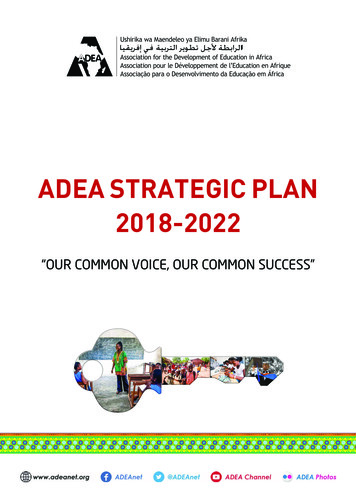
Transcription
ADEA STRATEGIC PLAN2018-2022“OUR COMMON VOICE, OUR COMMON SUCCESS”
Ushirika wa Maendeleo ya Elimu Barani AfrikaAssociation for the Development of Education in AfricaAssociation pour le Développement de l’Education en AfriqueAssociação para o Desenvolvimento da Educação em ÁfricaWho is ADEA?ADEA OUTREACHThe Association for the Development of Education in Africa (ADEA) is the voice of educationin Africa and has played a significant role in the education space for the past 30 years as aEducation is the key to unlockingconvener, knowledge creator, and forum for policy dialogue.Africa’s youth potential!ADEA is a partnership between African education and training ministries, bilateral andmultilateral development cooperation agencies, researchers, education and technicalexperts.ADEA is a forum for policy dialogue that promotes innovative policies and practices bypooling and disseminating ideas, experiences, learning and knowledge among actorsthroughits Inter-Country Quality Nodes (ICQNs) and Task forces. Join our missionADEA FAWEADEA provides support for evidence-based research and knowledge generation on Africaneducation and training.www.adeanet.orgADEAnet@ADEAnetADEA ChannelADEA PhotosADEA seeks to empower African countries to develop education and training systems thatrespond to their emergent needs and that drive Africa’s social and economic transformationsustainably.About ADEA55102Ministries ofEducation inAfrica served byADEAYears of closecollaboration withthe AfricanDevelopment BankGroup (AfDB),ADEA’s hostinstitution5Strategic Pillarsunderpinning ADEA’swork: ContinentalEducation Platformand Advisory &Execution SupportServices14Developmentcooperationpartners onADEA’s SteeringCommittee,originating fromfour continentsMISSION:To serve as an openand flexible pan-Africanorganization that informsand facilitates thetransformation of educationand training to driveAfrica’s accelerated andsustainable developmentWays that ADEAexpresses itsstrength andconvening power:as a Forum,Network,Partnership,Platform & Catalyst3Years supporting themonitoring and reporting onthe Continental EducationStrategy for Africa (CESA)and the SustainableDevelopment Goal (SDG) 430VISION:High qualityAfrican educationand training gearedtowards the promotionof critical knowledge andskills for accelerated andsustainable developmentin AfricaIMPACT:African countriesempowered to developquality and equitableeducation and trainingsystems that respondto their emergent needsand drive Africa’ssustainable socialand economictransformation9Years contributing toeducation and trainingin Africa (1988 – 2018)ADEA’s main implementingentities : 8 Inter-Country QualityNodes (ICQNs) and 1 Task Force115820ADEA Biennalesand Triennaleson educationand trainingsuccessfullyheldRegions of Africacovered by ADEA’sinterventionsAfrican Union’sCESA ClusterssupportedYears of closecollaboration withthe African Union onEducation PolicyADEA’s Diverse Networks and its Inter-CountryQuality Nodes (ICQNs) and Task ForceSupports evidence based monitoring and reporting for CESA* and SDG41Civil Society,Youth andDiasporaFAWE**Girls’ andWomen’sEducation(Kenya)Task ForceEducationManagementand PolicySupport(Zimbabwe)Fosters the promotion of the Early Childhood Development best practicesand metrics in AfricaICQNEarly ChildhoodDevelopment(Mauritius)Expands higher education research opportunitiesEnsures the integration of African languages into education, promotingdiversity and maximizing educational reach
Why is ADEA needed?Africa is the continent with the youngest population in the world with a significantdemographic dividend that can be leveraged to stimulate socio-economic growth.Africa must innovatively and meticulously foster youth skills development, with dueconsideration of global trends, industries, labour market and socioeconomic needs.The Continental Education Strategy for Africa 2016-2025 (CESA 16-25) considers “qualityand relevant education, training and research as core for scientific and technologicalinnovation, creativity and entrepreneurship”, thus the need for an institution that creates theenabling environment for this to be achieved.2 ADEA’s policy dialogue interventions at continental and regional levels haveproduced different positive outcomes in terms of policy reforms in the use ofcontractual teachers, multi-grade teaching, integration of African languages andcultures into education, Early Childhood Development, curriculum reforms, etc. ADEA has promoted peer learning among African countries through its InterCountry Quality Nodes (ICQNs) network and helped identify scalable and replicableinnovative solutions to key challenges areas in education. ADEA has promoted the paradigm shift from the conventional Technical andVocational Education and Training (TVET) to the flexible and responsive Technicaland Vocational Skills Development (TVSD), with notable reforms in Kenya, Liberia,Nigeria, and Rwanda. ADEA helped to develop capacity in African governments’ national EducationManagement Information Systems (EMIS) through seminars, peer reviews andtechnical assistance. Ministries now benchmark their EMIS against set Norms andStandards. ADEA has institutionalized the sharing of experiences and lessons among Africancountries. In accordance with the principles of the African Union’s Second Decade ofEducation, ADEA encouraged education ministers and experts in Africa to adopt thepractice of sharing experiences, pooling expertise, providing mutual assistance andtaking the lead in finding solutions to their challenges in education on the continent.
Impact of ADEAInitiated the creation of a Committeeof 10 African Heads of StateChampions of Education, Scienceand Technology, in collaborationwith the African Union (AU)Led the process of setting up of theAfrica Education Fund (AEF)Strengthened EducationManagement InformationSystems (EMIS) in more than30 African countries since2000 through capacitybuilding and peer reviewsInfluenced informed educationpolicy development in Africathrough high level policy dialogueforums (Biennales and Triennales)since 1991Led the unanimous adoptionof policy guide on theintegration of Africanlanguages and cultures intoeducation leading to the useof mother-tongue instructionin the first three years ofschool in several AfricancountriesADEAInitiated significant policy reformsas a result of Education SectorPeer Reviews in Angola,Democratic Republic of Congo,Gabon, Nigeria and MauritiusProduced close to 2,000publications and studies oneducation issues in AfricaInfluenced the adoption of anEarly Childhood Developmentpolicy in over nineteen AfricancountriesADEAand the African Union (AU)ValuepropositionImplementingCapacity Building SupportedAU in all eight Continued cooperationADEA willcontributeto empowering African countries to develop educationand trainingpriority areas of its Plan ofwith AU, in partnershipAction forrespondthe Secondits observatoriessystems thatto their emergent needs and drive Africa’swithsustainablesocioDecade of Education forIPED and CIEFFA , on(2006-2015)economicAfricatransformation,driven by two continental- and country-basedstrategic pillarsthe ContinentalEducation Strategy for SupportingtheAUCESAaligned to CESA 16-25 and SDG4.Africa (CESA 16-25)*Cluster networks inreporting on CESA andSDG4-5 implementationPriority Setting StrengtheningEducation ManagementContinentalEducationInformation ortPlatform Supportingthe fostering collaborationICQNnetworkdevelopment of CESAand16-25coordinationindicators and across stakeholdersreportingframeworksandnational borders.GovernanceServingas a pan-African knowledge hub SteeringCommittee comprisingthe ADEA Bureau (also thefor peer-to-peerlearning.African Union's Bureau of Specialized Technical Committeeon Education, Science and Technology – STC-EST), ICQN hostMinisters, developmentcooperationpartners,Elevatingthe voiceof Africaon and arepresentative from the private sector, civil society and youtheducation priorities at regional,continental and global levelsAdvisory and Continued collaborationand strengthening ofRegional EconomicCommunities (RECs)Facilitates collaborationamong the Ministries incharge of Education,TechnologyandExecution Science,SupportServicesInnovation Serving the needs of African Governmentsto deliver inclusive relevantand equitableMonitoringquality education by providingAdvisoryProduced ContinentalandRegionalperformanceand Execution SupportServices.reports for decision-makingby the Conference ofMinisters of Education ofDelivering a complete packageof servicesthe African Union(COMEDAF)to countries, including the diagnosis ofcountry level needs, implementationandIPED: Pan-AfricanInstituteof Education for Developmentmonitoring ofpoliciesandprogramsCIEFFA: International Centre for Girls’ and Women’s Education in rategy for Africa 2016-2025 (CESA 16-25)3**Provide support to AU’scontinental priorities withinAfrica’s Agenda 2063 and2030 SDG Agenda
ADEA has broken down both strategic pillars into a total of eight Strategic Objectives (SOs).Continental Education Platform1. Strengthened ICQNNetwork2. Knowledge Hub3. High-Level StakeholderForumsICQNs will befurnished with greaterfinancial and humanresources toencourage greaterpeer learning,knowledge sharing,and sharing of bestpractices acrossministries of educationADEA’s existingleadership andknowledge disseminationin the education spacewill be harnessed in thecreation of a moreinstitutionalizedknowledge hub forgreater pan-African peerlearning and sharing ofbest practicesThe high-level conveningpower of ADEA will bepreserved throughparticipation in events at bothregional and continentallevels, and bringing togetherstakeholders fromgovernment, developmentagencies, civil society, privatesector, and youthAdvisory and Execution Support Services4. DataCollection andDiagnosticTools5. EvidenceBased PolicyDevelopment6. DeliveryandResourceMobilization7. LeadershipandManagement8. MonitoringPolicyReformADEA supportscountries toshape toolsthat gatherdata anddiagnoseneeds in thenationalcontextsADEA providestechnicalsupport tocountries todevelop newpolicies orstrengthenexistingpolicies to beresponsive tocountry needsADEAprovideshands-ontechnicalsupport fortheimplementation andexecution ofpolicies andprogramsADEA esthroughtraining keyministerialstaff tomanage andlead teamsADEAprovidescapacitystrengtheningto developnationalsystems thatcan monitorand evaluatepolicy reformprogress4
Key activities202020192018 Close outstandingactivities from 2017and begin roll-out ofnew strategicinitiatives; Setup ADEASecretariat; Develop analyticalframeworks, tools andorganizationalstructure for newplatforms;Undertakeconsultations,advocacy andpartnerships forstrategic initiatives;Initiate development ofthe first RegionalCenter and pilotdeployment of expertsin two countries. Deepen implementation ofstrategic initiatives toreach 12 – 15 countrieswith advisory andexecution supportservices; Operationalize RegionalCenter,set-up of two deliveryunits, deploy experts infour countries; Launch the KnowledgeHub and engage actorsfrom across the continenton education;Undertake mid-termmonitoring and evaluationto identify key lessonsfrom programimplementation to informfuture roll-out modalities. Expandimplementation ofadvisory andexecution supportplatform to reach anaggregate total of 20countries over thethree years ofimplementation; Expand continentaleducational platformactivities coveringmore knowledgeproducts, meetingsand ICQN activities; Undertake review ofstrategic plan at theend of 2020 to informthe next strategicplan for ADEA.Lean secretariatADEA has developed a new secretariat structure to ensure the effective implementation ofits strategic objectives. The team will be responsible for the management of the funds raised,activity prioritization and monitoring progress of implementation, and achievement of highlevel results. The secretariat structure covers the following areas:5
ProgramsKnowledge managementRegional Centre coordinationCommunication and external relationsResource mobilization and partnershipRobust GovernanceIn anticipation of its African-led role, ADEA has developed a new governance structure thatis sustainable and effective. The new structure ensures that the membership, structure, andresponsibilities of the governance and advisory committees, correspond to the needs andfunctions of the organization.ADEA’s governingauthority for policyand strategySteering CommitteeFollows-up on the strategicdirection and decides on mattersof operations relating to ADEA’sfunctioning and activitiesSupports the coordinationof programs across thetwo strategic pillarsExecutiveCommitteeContinental EducationPlatformADEA SecretariatAdvisory and ExecutionSupport ServicesICQN NetworkRegional CenterImplementing and monitoring of programsExpanding partnershipADEA has historically been a partnership between Ministries of Education of Africancountries, the African Development Bank Group, the African Union and developmentcooperation partners. However, given the evolution of the Association, there will be strongerengagement through the ICQNs and with new players, including the private sector, civilsociety organizations and new financial partners.6
Collaboration with the AfDBWith the Bank as its host institution, ADEA will strengthen itsrelationship with, and capitalize on, the Bank’s relationshipswith its Regional Member Countries and make use of Bankrepresentatives in field offices. Key potential areas forcollaboration include those linked to the Human CapitalStrategy and the High Fives (and Jobs for Youth in particular).Collaboration with the African UnionAfDBDevelopmentpartnersADEAAUWith the updated governance structure, ADEA will enter into anew MOU with the AU to clarify its role in the implementationof CESA 16-25, particularly the first and fifth strategicobjectives. The ICQNs will continue to collaborate and supportthe relevant CESA Cluster thematic areas.Collaboration with African governmentsAfricangovernmentsADEA will maintain its strong ties with African governments byincluding government representatives in the governancebodies and by supporting close consultation with countries onkey activities in the Continental Education Platform and theAdvisory and Execution Support Services.Collaboration with Development PartnersADEA will continue to engage with development partners,which are a main source of funding for the Association, toidentify opportunities for collaboration and to increasecoordination of efforts.Monitoring successADEA will collect data to track the progress of the strategy’s implementation. This will enableaccountability and performance evaluation of the organisation. ADEA will use a combinationof quantitative and qualitative indicators to track its impact in the short, medium and longterm.Long-termoutcomeindicators7 Percentage of GDP/budget allocated to education sector by African governments Percentage improvement on key educational sector outcomes (access, quality,and relevance) in countries benefiting from ADEA capacity strengthening support No. of countries consistently providing quality data on educational sectorindicators to continental and global bodies No. of African countries with effective inter-ministerial committees overseeingimplementation of education programs Increased level of harmonized reporting of global and African educationframeworks
Medium-termoutcomeindicators No. of government officials who report improved capacity as a result of ADEAsupport No. of countries using improved EMIS systems and tools No. of evidence-based policies developed by countries No. of countries that report improved implementation of programs as a result ofknowledge gained from ADEA peer-learning activities Short-termoutcomeindicators No. of experts embedded within Ministries of EducationNo. of countries provided with technical assistance delivered through regionalcentersNo. of civil servants trained, mentored or coached by ADEANo. of countries provided with short-term technical support on need basisNo. of countries adopting core indicators for data collectionPercentage of annual visitors to ADEA’s website and followers on social mediaplatformsInter-Country Quality Nodes (ICQNs)There are currently six ICQNs, one transitioning from an existing Working Group, and one tobe launched in 2018:Inter-Country Quality NodeChampion / Host country1.Early Childhood Development (ICQN-ECD)Mauritius2.Literacy and National Languages (ICQN-LNL)Burkina Faso3.Mathematics and Science Education (ICQN-MSE)Kenya4.Peace Education (ICQN-PE)Kenya5.Teaching and Learning (ICQN-TL)Rwanda Network of African Learning Assessments (NALA)Senegal (Francophone node) &Zambia (Anglophone node)6.Technical and Vocational Skills Development (ICQNTVSD)Côte d'Ivoire7.Higher Education and Scientific Research (ICQN-HESR)Senegal8.Non-Formal Education (ICQN-NFE) (a transition fromWGNFE)Burkina Faso8
Association for the Development of Education in Africa (ADEA)African Development Bank Group (AfDB)Immeuble CCIA Plateau, Avenue Jean-Paul II, 01 BP 1387Abidjan, Côte d’IvoireTel: ( 225) 2026.3964 - Email: adea@afdb.org
3 Value proposition ADEA will contribute to empowering African countries to develop education and training systems that respond to their emergent needs and drive Africa's sustainable socio-economic transformation, driven by two continental- and country-based strategic pillars aligned to CESA 16-25 and SDG4.

